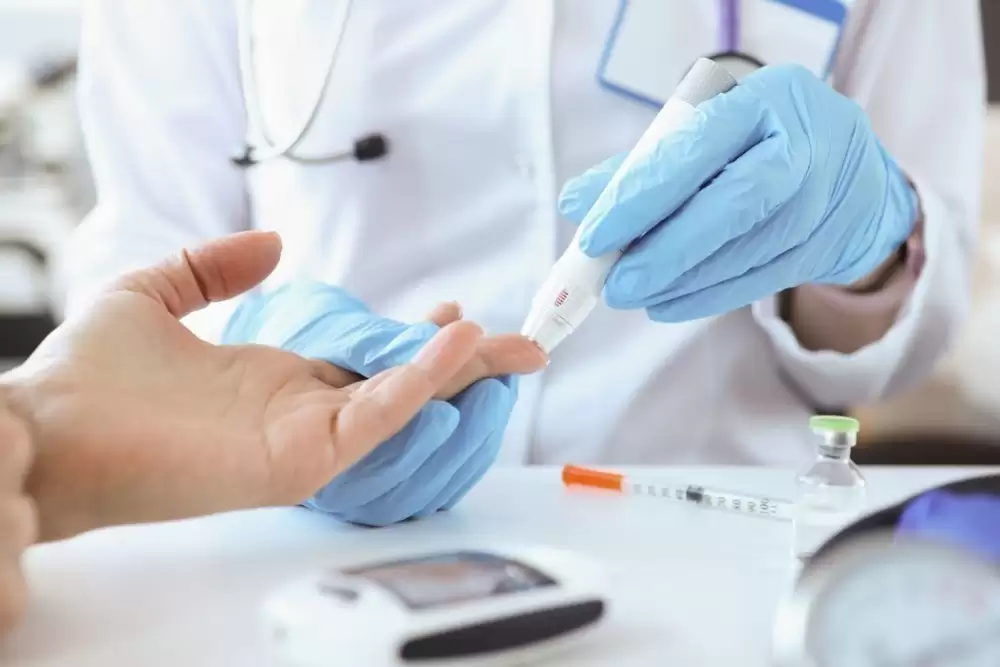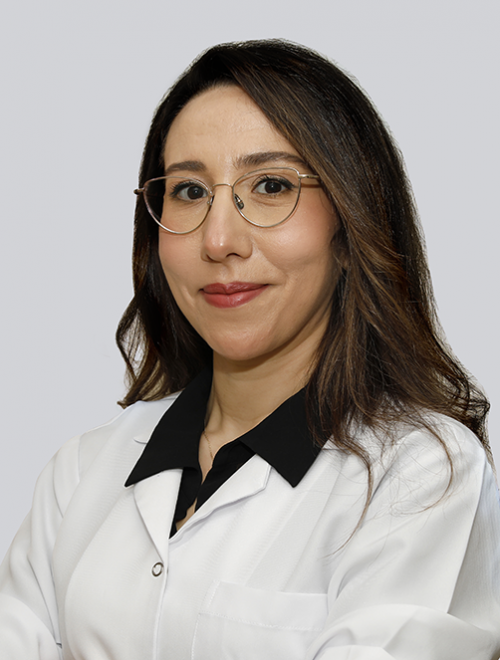Best Endocrinologist in Dubai

What is Endocrinology?
Endocrinology is the branch of medicine that deals with the endocrine system, or the hormone-controlling system. Endocrinologists are doctors who specialize in diagnosing illnesses of the glands. An endocrinologist is your best advocate when dealing with hormone disorders because these specialists specialize in these conditions, which can be complex and have hard-to-spot symptoms.
Some patients need unique care due to other health conditions that affect their hormonal conditions. Hormones regulate many body functions such as metabolism, growth, reproduction, respiratory function, and movement or sensory perception.
When you are facing a diagnosis of a hormonal condition, such as diabetes or thyroid problems, and other hormonal complications, you may be referred to an Endocrinologist. Our Diabetes and Endocrinology department has studied hormonal conditions extensively and knows the best treatments available, even when conventional treatments do not work well. Your plan of care will be evaluated based on your condition, behind several medical tests and procedures you will receive a treatment plan that is based on your condition and we will guide you through your treatment.
At HMS Mirdif Hospital, our commitment is to make a difference in people’s lives by providing the best possible care, treatment, and outcomes with our exceptionally skilled Doctors and professional medical team. Caring for you with our advanced technology.
What Is the Role of an Endocrinologist?
Hormones are released by glands in the body. Endocrinologists are doctors who specialize in treating persons who have hormonal abnormalities caused by glands in the endocrine system or certain malignancies. The overall goal of treatment is to restore a patient's body's normal hormone balance.
See a qualified physician is only half of remaining healthy; the other half is getting educated on how to keep that healthy. With Dr. Suzane Koubar and Dr. Omar Dhaimat, you get the greatest therapy as well as advice on how to practice active health and well-being.
Diseases and Conditions affect Endocrine System
Chronic diseases and other conditions can have a variety of effects on the endocrine system. Hormones are broken down (metabolized) into inactive molecules once they exert their effects on their target organs. Hormones are broken down mostly by the liver and kidneys. In persons with chronic heart, liver, or renal disease, the body's ability to break down hormones may be impaired.
The abnormal endocrine function can be caused by a variety of factors, including:
- Congenital (present at birth) or genetic flaws (see the section on Genetics below)
- Some cancer therapies include surgery, radiation, or a combination of these.
- Traumatic wounds
- Tumors, both cancerous and non-cancerous
- Infection
- Autoimmune destruction (when the immune system attacks and damages the body's own organs
- Vitamins or drugs
Conditions Treated by Our Specialist Endocrinology Team
Endocrinologists are doctors who specialize in diagnosing and treating hormone issues by restoring the proper balance of hormones in the body. Services that our Medical team can handle are:
- Thyroid disease
- Metabolic disorders
- Pituitary conditions
- fertility conditions
- Parathyroid, calcium, and bone conditions
- Conditions of the Adrenal gland
- Cholesterol (lipid) disorders
- Neuro-endocrine conditions
- Diabetes screening
- Diabetes comprehensive and complications work up
- A gestational diabetes screening panel
- Diabetes education modules (basic and comprehensive)
- Continuous Glucose Monitoring (CGM)
- Weight management with lifestyle intervention
- Endocrine dynamic testing
- Screening for DMT2 in children
- Screening for metabolic syndrome and obesity in children
- Pediatrics type 1 diabetes panel (insulin level)
- Calcium balance disorders
What is Diabetes?
Diabetes is a condition in which your blood glucose, often known as blood sugar, is abnormally high. Diabetes is a long-term illness that affects the way your body converts food into energy. The majority of the food you eat is converted to sugar (also known as glucose) and absorbed into your bloodstream. When your blood sugar levels rise, your pancreas is prompted to release insulin.
Your main source of energy is blood glucose, which comes from the food you eat. Insulin, a hormone produced by the pancreas, aids glucose absorption into cells for use as energy. Your body may not produce enough or any insulin, or it may not use insulin effectively. Glucose remains in your circulation and does not reach your cells as a result.
Having too much glucose in your blood might lead to health issues over time. Although there is no cure for diabetes, you may make efforts to manage it and stay healthy.
Types of Diabetes:
- Type 1 diabetes: Your body does not produce insulin if you have type 1 diabetes. Your immune system targets and destroys the insulin-producing cells in your pancreas. Diabetes type 1 is most commonly diagnosed in children and young adults, but it can strike anyone at any age. To stay alive, people with type 1 diabetes must take insulin every day.
- Type 2 diabetes: Your body does not generate or utilize insulin well if you have type 2 diabetes. Type 2 diabetes can strike at any age, including youth. This type of diabetes, on the other hand, is more common in middle-aged and older adults. Kind 2 diabetes is the most frequent type.
If you're 45 or older, have a family history of diabetes, or are overweight, you're more likely to acquire type 2 diabetes. Physical inactivity, race, and certain health issues like high blood pressure can all increase your risk of acquiring type 2 diabetes. If you have prediabetes or gestational diabetes while pregnant, you're more likely to acquire type 2 diabetes. - Gestational diabetes: During pregnancy, some women acquire gestational diabetes. This type of diabetes usually goes away once the baby is born. If you've experienced gestational diabetes, though, you're more likely to develop type 2 diabetes later in life. Diabetes diagnosed during pregnancy may be type 2.
These are the most frequent kinds of diabetes.
All Types of Diabetes Treatments
- Maintaining a healthy weight with a good diet and activity plan is an important element of treating diabetes — and your overall health: Eating well is important. There is no such thing as a diabetes diet, contrary to popular belief. Reduce your intake of saturated fats, processed carbs, and sweets while increasing your intake of fruits, vegetables, lean proteins, and whole grains – foods high in nutrition and fiber but low in fat and calories. It is, in reality, the best eating strategy for the entire family. Sugary meals are acceptable on occasion, as long as they are included in your meal plan.
- Physical activity is important. People with diabetes, like everyone else, require frequent aerobic activity. Exercise reduces blood sugar levels by allowing sugar to enter your cells and be used for energy. Exercise also improves insulin sensitivity, which means that less insulin is required to deliver sugar to your cells.
- Type 1 and Type 2 diabetes treatments: Insulin injections or the use of an insulin pump are used to treat type 1 diabetes, as are frequent blood sugar checks and carbohydrate counting. Type 2 diabetes is treated with a combination of lifestyle adjustments, blood sugar monitoring, diabetic medicines, insulin, or both.
- Keep an eye on your blood sugar levels. You may check and record your blood sugar up to four times a day, or more frequently if you're on insulin, depending on your treatment plan.
- Insulin therapy is required for people with type 1 diabetes to live. Insulin therapy is required for many persons with type 2 diabetes or gestational diabetes.
- Medications that are taken orally or in other ways. Other oral or injectable drugs may also be recommended. Some diabetic treatments increase the amount of insulin produced and released by your pancreas. Others stop your liver from producing and releasing glucose, requiring less insulin to carry sugar into your cells.
- Transplantation: A pancreas transplant may be an option for some persons with type 1 diabetes. Islet transplants are also being considered. You wouldn't require insulin if you had a successful pancreatic transplant.
Frequently Asked Questions about Endocrinologists in Dubai.
- Which of the following is the most frequent Endocrine Disorder in Dubai?
Diabetes is becoming more common in Dubai as a result of poor eating habits and a sedentary lifestyle. The situation is similar on a global scale, with around 463 million diabetes cases registered.
Diabetes is an incurable condition, thus avoiding it is always preferable to treating it. Physicians advocate a daily exercise plan as well as a nutritious diet to reduce the risk of having this ailment. - What factors have an impact on the endocrine system?
Genetics, puberty, pregnancy, stress, chronic diseases, and aging all have an impact on the health of your endocrine system. These factors can cause undesirable symptoms or even chronic diseases based on the level of hormones in your body.


